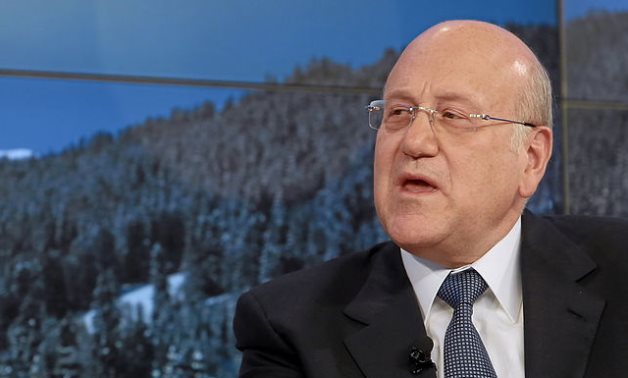
File- Najib Mikati, PM of Lebanon, speaks during the session 'Transformations in the Arab World' at the Annual Meeting 2013 of the World Economic Forum (WEF) in Davos, Switzerland, Jan. 25, 2013.- photo by WEF
CAIRO - 11 December 2021: Egyptian President Abdel Fattah El-Sisi promised to study the possibility to increase the share of Egyptian gas that would be exported to Lebanon via Syria soon, said Lebanese Prime Minister Najib Mikati in an interview with Egypt’s state-owned newspaper Al-Ahram.
The share of the Egyptian natural gas to Lebanon is estimated at 650 million cubic feet, he said.
Mikati added that his meeting with President Sisi was “quite fruitful and positive”, noting that President Sisi is a person who loved Lebanon and all the Lebanese people.
In his meeting with President Sisi on Thursday, Mikati has asked for a number of demands including in the field of natural gas to urgently generate electricity for the Lebanese people, the Egyptian Cabinet said, adding that President Sisi directed the government to meet these demands as quickly as possible.
President Sisi affirmed Egypt’s keenness to achieve the Lebanese interests and spare Lebanon from the dangers posed by the region’s conflicts.
This comes as part of Egypt’s keenness to help the Lebanese state’s capability and strength as well as people’s wealth and national fabric, Sisi said.
Prime Minister Mostafa Madbouly, Head of General Intelligence Service Abbas Kamel and Foreign Minister Sameh Shoukry attended the meeting.
Earlier this month, Mikati hailed Egypt’s continuous support to his country during its critical times and hardships.
Egypt will begin to export 60 to 65 million cubic feet of gas per day to Lebanon, according to statements by the Minister of Petroleum to Reuters on the sidelines of an oil and gas conference in Abu Dhabi in November 2021.
In October, Egypt’s Minister of Petroleum announced that his country will export natural gas to Lebanon in the coming weeks.
This statement came after his talks, held for two days, with Lebanese counterpart Walid Fayad, where they discussed a road map for supplying Lebanon with Egyptian gas, including all technical, commercial, and contractual aspects, as well as the supply mechanism.
These discussions were held after nearly a month of the agreement of the Arab Gas Pipeline countries "Egypt, Jordan, Syria and Lebanon" on September 8, to deliver Egyptian natural gas to Lebanon via Jordan and Syria.
The Arab gas pipeline
The Arab Gas Pipeline (AGP) has started in late 1990 planning for the extension of 1,200 kilometers of the Arab gas pipeline that aims at delivering the Egyptian gas to Jordan, Syria and Lebanon. Egypt has initiated the pumping with 28 million cubic meters of gas daily to Lebanon in 2009.
AGP was implemented in three phases, starting from Al-Arish to Aqaba, with a length of 265 km and a capacity of 10 billion m3 annually. The supply of natural gas from Egypt to Jordan under this phase began in mid-2003.
The second phase extended from Aqaba to the Rehab area in northern Jordan with a length of 393 km. The supply of gas to power plants in the north of the Hashemite Kingdom began in February 2006, while the second phase from Rehab to the Jordan-Syria border was completed with a length of 30 km in March 2008.
The southern part of the third phase was implemented inside the Syrian territory, extending from the Jordanian-Syrian border to the city of Homs with a length of 320 km and was put into operation in July 2008.
Exporting Egyptian natural gas to Lebanon via Jordan began in 2009, until it stopped in 2011 after pipelines were damaged during the Syrian civil war and sabotage attacks.
Syrian Minister of Oil and Mineral Resources Bassam Tohmy considered the Arab Gas Pipeline project one of the most important joint Arab cooperation projects.
Syria agreed to transfer Egyptian gas and Jordanian electricity to Lebanon through lines that pass through Syrian territory.
Additional reporting by Samar Samir

Comments
Leave a Comment